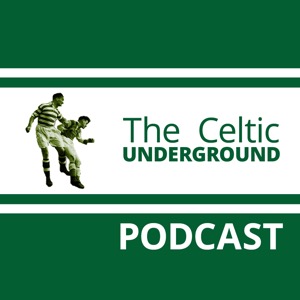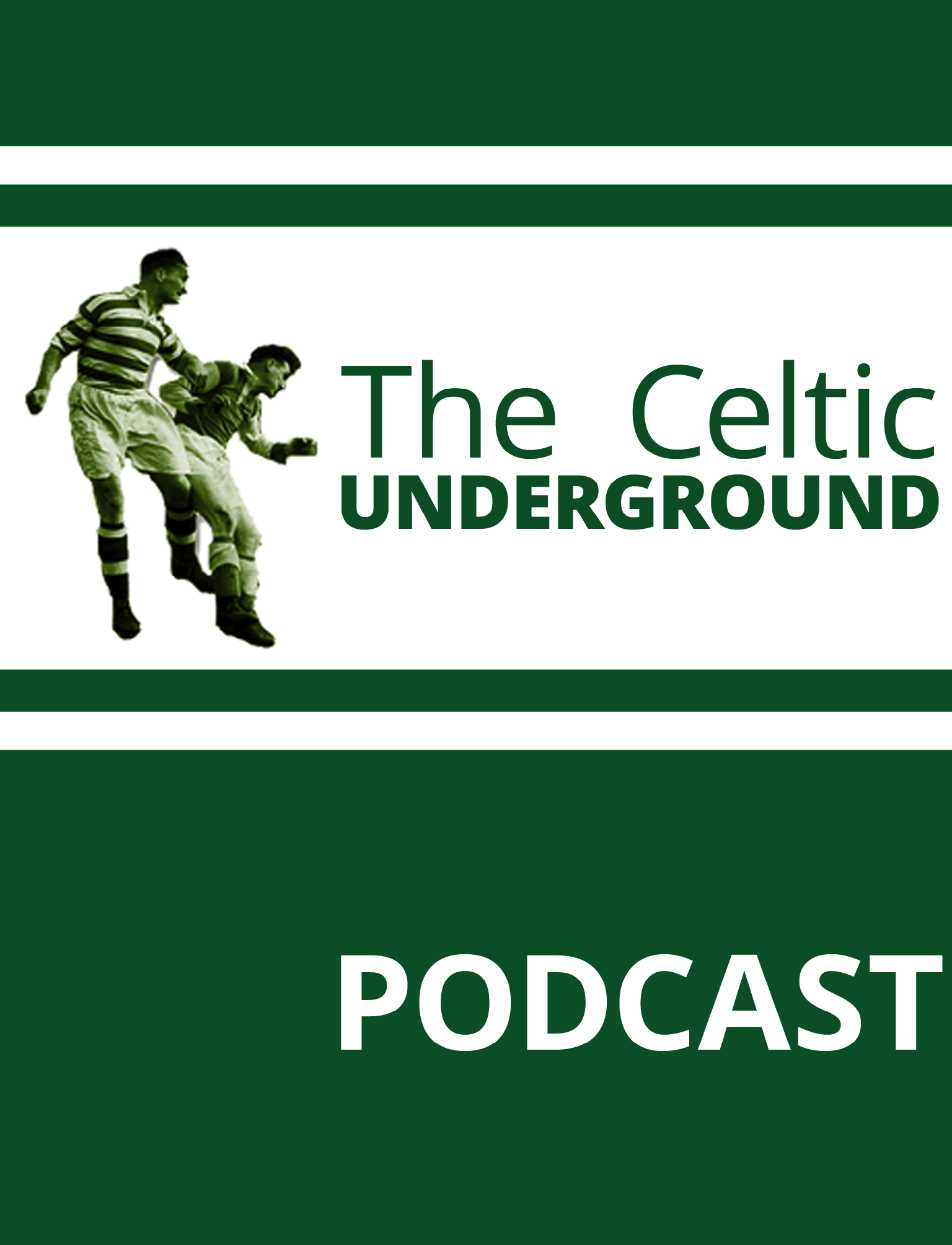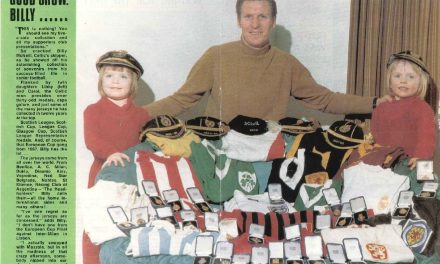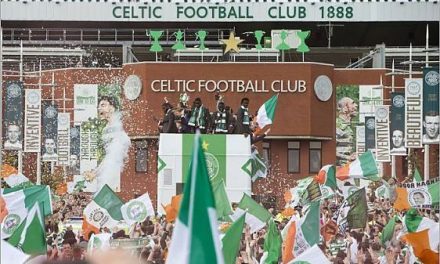As Celtic fans we are hugely fortunate to have a terrific number of Celtic books related to the club to admire. I have over 150 of them at least and whether it’s biographies, histories or even fiction, there is much to appreciate. Few clubs can match the ‘library’ that Celtic fans can boast of.
Here is a list of the top ten Celtic books that I have read. Of course it’s all subjective and we all have different opinions but it’s only a bit of fun. And it should be noted that the books are in no particular order.
- Glasgow Celtic 1945 – 1970 (Campbell)
This was the first Celtic book I ever read seriously. Although printed in 1970 I received it as a present in Christmas 1976 and it was (literally) a footballing education just reading it. The book conveys in full the agonies of the post war years which were interspersed with the odd glory days such as the Coronation Cup final and the 7-1 game in 1957. However, it’s the last few chapters which thrilled me. The champagne years from 1965-1970 are depicted in great detail, cleverly inserting newspaper reports from the period to give it an authentic feel. I only found out in later years that Tom Campbell had wrote this fine effort whilst based in Canada, which must have been tremendously difficult for him in those far off pre-internet days of the late 1960’s. There are two particular Canadian newspaper articles – Fierce holy war in a violent city and As others see us – which I would recommend reading purely on their own merit. They perfectly describe Glasgow and Celtic in particular in the 1960’s. Still a great read after nearly 50 years.
2.A Lifetime in Paradise (McNee)
When I was a boy I marvelled at Jimmy McGrory’s scoring record. Grainy old pics would show him flying through the air sending yet another heavy leather ball into the net. Jimmy is renowned for his goal scoring records many of which remain to this day. And yet, when I read this book, the thing that struck me most was Jimmy’s modesty and humility. He was immensely proud of his Garngad working class roots and in his younger days he would leave early in the morning to play golf in his fancy plus fours so that no one would see him in his golfing gear and think he was showing off. This was also the man who was offered a blank cheque to sign for Arsenal around the time of the great depression and refused out of loyalty to Celtic. It was loyalty that the Celtic management did not deserve and the Celtic directors shamefully abused Jimmy’s faith in the club. It must be noted that this fine effort was penned by a certain ‘Gerald’ McNee in the days when Gerry was highly regarded as a journalist before he morphed into a poisonous hack. Jimmy gave him a Scottish Cup medal for writing his story, something that McNee was always keen to point out.
3. Not playing for Celtic (Bennie)
As someone who was raised in an inner city Catholic environment it was somewhat inevitable that I would follow Celtic. Because of this I am always fascinated by stories of people who decide to support Celtic for a whole variety of reasons. David Bennie was such a guy. Attending a Glasgow non-dom school with a father who was ambivalent towards football, David became an unlikely Celtic fanatic. In 1993, Nick Hornby had made a huge name for himself with his book Fever Pitch in which he recalls his life through Arsenal games. Bennie copies this superbly well from a Celtic fan’s viewpoint and paints a great picture of Celtic’s joy and heartbreak (as well as his own personal stuff) from the 70’s to the 90’s. In 2015 I tried to trace him down for a podcast to celebrate 20 years since his book. I managed to find his sister who told me that he did not wish to be contacted which is a huge shame. It’s a great pity he is somewhat reclusive as this was a superb book and he may not actually appreciate how popular it is amongst Celtic fans.
4. One afternoon in Lisbon (McCarra/Woods)
Of all the books referring to Lisbon this one is the best. It was written to celebrate the 20th anniversary of Celtic’s greatest achievement in 1987 at a time when the Lisbon Lions were all alive and in good health. The book is cleverly divided into chapters on each player which focuses on their Celtic life and recollections. Jimmy Johnstone recalls training with Celtic in 1977 and hearing a rumour that Jock Stein wanted to re-sign him only for nothing to materialise. He was only 31 and found it devastating. John Clark moved to Morton in 1971 and by 1973 Jock wanted him back to assist with the reserves. Despite having no saleable value, Morton chairman Hal Stewart, greedily insisted on a fee and John was only able to return as a coach and that was a sad end to his playing days. The details of the away games en route to Lisbon are described in great detail and make it an engrossing read.
5. Happy birthday dear Celtic (Beattie)
This is another book which was written to commemorate another anniversary. The 1987-88 centenary season will always be recalled with particular fondness by those of us who remember it. Despite being underdogs that season Celtic recorded a famous league and cup double against all the odds. Douglas Beattie interviews each player from that squad and notes their often fascinating recollections. The story of the Celtic players meeting Maggie Thatcher before the 1988 Scottish Cup final is of particular interest. When researching his book, Douglas found it very difficult to contact Mick McCarthy, then manager of Wolves, and was to told Mick did not talk to journalists. However, when he heard it was relating to Celtic he agreed to give Douglas 20 minutes. 2 hours later big Mick was still waxing lyrical about the Celts and about that glorious season.
My search for Celtic’s John (Greig)
John Thomson is a Celtic legend, the player who died tragically young in the most unfortunate circumstances. Because of this John will be forever young in people’s minds. Tom Greig details John’s life wonderfully well from his early days in Fife to international stardom with Celtic. He researched all aspects of John’s life and also catalogued aspects of Sam English’s life. English, who fatally clashed with John, was haunted by the incident for the rest of his life and it was fascinating to read that Sam remained in close contact with John’s family until his death in 1967. Few Celtic books have been so thoroughly researched and this book is a truly moving read.
7. The Quality Street Gang (Dykes)
Few Celtic books have been more keenly anticipated by myself than this one. My father told me he used to take me to see Celtic reserve games in the early 70’s on Friday evenings, which I can barely recall. The reserve side of that period were so talented they were called the Quality Street Gang and won everything in sight, thus emulating the Celtic first team, during Jock Stein’s glory years. Everyone is aware of the stars of that team, the magnificent talents such as Kenny Dalglish, Danny McGrain, Davie Hay and Lou Macari. However, what makes this book most interesting is the stories of those who did not make it such as Ward White, John Murray and Tony McBride. White’s story is especially sad. He was desperately close to making his debut in 1972 only to fall ill and lose his chance. The book also catalogues the sadness for Celtic fans that only McGrain saw his peak years as a Celt as the others either moved on or failed to reach their true potential. We can only think of what could have been. They should have been the team of the 1970’s.
8. The Iron Man (Sullivan)
There are few more loved Celts than Sean Fallon. As player, captain, coach and manager (for one season) Sean Fallon gave his all to Celtic. In the late years of his life he allowed Stephen Sullivan to tell his story, of the wee boy from Sligo who believed it was his destiny to play for Celtic and became the trusted lieutenant to the great Jock Stein during the Celtic glory years. Sean was a man of great faith and this comes across very well in the book. This is also another ultimately sad story. Despite great service, Sean was shamefully demoted by the Celtic board in 1976 and sacked in 1978 during a managerial reshuffle. It’s also fascinating to note that even in later years Sean maintained that he could have persuaded Kenny Dalglish to stay at Celtic in 1977. Yet another case of what might have been.
9. Celtic The Early Years (Sweeney)
I have to confess that my knowledge of Celtic’s earliest years is not the greatest. Brendan Sweeney’s excellent book details in full the earliest Celtic days from 1887 to 1892 I found it most informative. Another well researched book, what comes across in this one is the fact that Celtic were very much a community club in its inception from the Catholic parishes in the surrounding areas. None of us in the 21st century can remotely begin to comprehend the poverty, deprivation and sectarianism that our forefathers suffered in Glasgow in the late years of the 19th century. People often note their pride in the Irish link to Celtic’s heritage but what this book emphasises is the strong links to the Catholic faith which people are less likely to focus on in the modern age. Brendan also notes that although Brother Walfrid is remembered as Celtic’s main founding father, there was a committee of men who worked tirelessly to ensure that Celtic were not only founded but went on to prosper.
10. The Road to Lisbon (Greig/McGarry)
This is a great wee Celtic book which appears to have gone under the radar. It’s a fictional book surrounding Lisbon in 1967 which details two things. 1 – The trials and tribulations of a group of young, Gorbals gang, Celtic fans, from fighting loyalists at Bridgeton Cross to travelling to the European Cup final in a battered old car. 2 – The thoughts that are going through Jock Stein’s mind as the final approaches. He recalls his mining days, his family, the disappointments in his life as he stands on the brink of his greatest achievements. A very clever book, the authors describe well the hopelessness of Gorbals life in mundane industrial jobs, living in slum tenement housing, not fit for purpose, with Celtic and their families their main reason for existence. If you haven’t read this one then it’s recommended.
Well that’s it. If your favourite is not here then no luck as I could only pick ten !






Hi St Anthony, Ian MacCallum did a great series of books called The Celtic,The Glasgow Irish &the Great war only 3 of the 6 books have been published ; do you have any idea when the next 3 will be published?
Hi Danny, Sorry for late reply. @jamiebhoy2009 on twitter will be the man to ask.